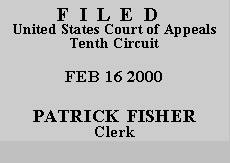

| MICHAEL P. PAALAN, | No. 99-3283
(D.C. No. 98-3411-GTV) (D. Kan.) |
The district court dismissed the action pursuant to 28 U.S.C. § 1915(e)(2)(B)(ii) on the ground that Paalan had failed to state a claim for relief. (See Doc. 4.) Relying on Feres v. United States, 340 U.S. 135, 146, 71 S. Ct. 153, 95 L. Ed. 152 (1950), in which the Supreme Court held that an injured party may not recover damages under the Federal Torts Claims Act for injuries that "arise out of or are [incurred] in the course of activity incident to service" in the military, the district court concluded that the defendants could not be held liable for monetary damages. (See id.) The court reasoned that Paalan's alleged injuries arose incident to his service in the military because a military inmate's incarceration is part of the military relationship. (See id.) The district court also found that Paalan was not entitled to a transfer to a medical confinement facility under the Eighth Amendment. (See id.) Finally, the district court explained that it could not grant relief in the form of criminal prosecution of the defendants. (See id.)
We find that the district court properly concluded that Paalan is neither entitled to a transfer to a medical confinement facility nor to criminal charges being brought against the defendants. We affirm the judgment as to these claims for substantially the same reasons set forth in the order of the district court. We are concerned, however, that the district court did not fully consider Paalan's claim that he was a civilian at the time the alleged injuries occurred and that the Feres doctrine is inapplicable in his case. It appears that the Navy involuntarily extended Paalan's active duty status for purposes of court-martialing Paalan. Paalan, however, provided some evidence in his Motion for Reconsideration to the district court (Doc. 6) to show that he was officially discharged before the military court involuntarily extended his active duty status.(1) (See id.) Paalan argues that the military did not have the authority to involuntarily extend his active duty status under these circumstances and that he therefore was actually a civilian at the time the alleged injuries took place. (See id.)
Our review of the relevant case law indicates that a person's military duty status affects the applicability of the Feres doctrine. See Walden v. Bartlett, 840 F.2d 771, 774 (10th Cir. 1988); Madsen v. United States, 841 F.2d 1011, 1012 (10th Cir. 1987). The Feres doctrine does not bar recovery of damages where the injured party was completely discharged from military service prior to the injury. See Valn v. United States, 708 F.2d 116, 119-20 (3d Cir. 1983) (finding that plaintiff was not barred from recovering damages under the Feres doctrine where he had been discharged and then improperly ordered to return to active duty at which time the injuries occurred). Cf. Murphy v. Dalton, 81 F.3d 343, 349, 352 (3d Cir. 1996) (finding that the military court lacked jurisdiction over a defendant who had been discharged prior to involuntary extension of active duty status for purposes of criminal prosecution). We find that the factual record in this case has not been sufficiently developed for this court to resolve Paalan's claims concerning his military duty status at the time of the alleged injuries and the applicability of the Feres doctrine. Although these claims may ultimately prove to be without merit, we find that the district court should have ordered a response from the defendants in order to make the necessary factual findings to resolve Paalan's claims. We therefore AFFIRM in part, REVERSE in part, and REMAND the case for further proceedings consistent with this opinion.
The mandate shall issue forthwith.
ENTERED FOR THE COURT
David M. Ebel
Circuit Judge
*.After examining the briefs and appellate record, this panel has determined unanimously to grant the parties' request for a decision on the briefs without oral argument. See Fed. R. App. P. 34(f) and 10th Cir. R. 34.1(G). The case is therefore ordered submitted without oral argument. This Order and Judgment is not binding precedent, except under the doctrines of law of the case, res judicata, and collateral estoppel. The court generally disfavors the citation of orders and judgments; nevertheless, an order and judgment may be cited under the terms and conditions of 10th Cir. R. 36.3.
1. We recognize that this issue may have been raised for the first time before the district court in Paalan's Motion for Reconsideration. However, a motion for reconsideration may be granted to prevent manifest injustice. Given the important question of whether Paalan was in the military at the time the injury occurred, and making allowances for the pro se nature of Paalan's initial pleading, we believe that justice requires that this matter be remanded for further consideration.